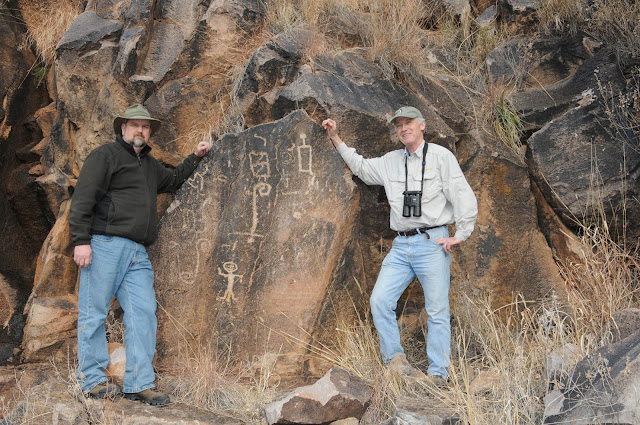 |
| Bobby Harrison (L) and Tim Gallagher (R) at Arroyo de los Monos, Mexico |
The
Imperial Woodpecker….an Ivorybill, and the largest of its clan, is, or was the
largest woodpecker that has ever lived.
This magnificent bird is the topic of Tim Gallagher’s latest book, Imperial Dreams.
Tim, a great
friend, and the person who was with me in 2004 when we saw the Ivory-billed
Woodpecker on Bayou de View, Arkansas has spent the last four or more years on
the trail of the Imperial Woodpecker of Mexico.
Tim made numerous trips to Mexico to interview people who saw the bird
in the middle of the last century, and to track down recent sighting that were
only a couple of years old.
I have had the
privilege to read the pre-release proof of the book, and like Tim’s previous
books it is a WINNER! Tim is one the
best authors I have ever read, and like his other books, once you start reading
you will not want to put it down. Tim
tells a riveting story of a bird whose natural history is virtual unknown. Tim has made a herculean effort to
successfully unravel the mystery of the imperial woodpecker. His travels through Mexico takes you to the
peaceful Arroyo de los Monos, to harrowing life and death encounters with
drug traffickers in Durango.
I was fortunate
to make a trip to Mexico with Tim in February, 2009. Tim writes about our adventure in the chapter
“From Ivorybills to Imperials.” It was a
great trip, and helped me to really appreciate my life here at home. My favorite part of the trip was Arroyo de
los Monos, the site of ancient petroglyphs that dated back some eight-hundred
years.
Tim, John, (our
guide) and I spent an entire afternoon in the arroyo photographing the ancient
works of art. From the start of the
trip this was the place I really wanted to visit, because it held what is
believed to be the oldest known drawing of an imperial woodpecker. Tim had been to the site on a previous trip
and knowing that I really wanted to see the imperial petroglyph made it a point
to get me there before the trip was over.
Know one really
knows why ancient peoples etched images onto rock surfaces. They could have created such works to tell a
story, make a statement or just pass time, but for what ever reason Arroyo de
los Monos is filled with petroglyphs.
The imperial petroglyph was about twenty-feet up the side of the canyon wall, and was in a difficult spot for someone to do an etching. Perhaps there was better footing eight-hundred years ago. I photographed the petroglyph from every possible angle and when I finished shooting the imperial petroglyph, I turned my camera to others. There were petroglyphs of avocets, coyotes, men, geometric shapes and creatures I could not identify. I shot them all. I could not have imagined a better way to end my adventure in Mexico.
The imperial petroglyph was about twenty-feet up the side of the canyon wall, and was in a difficult spot for someone to do an etching. Perhaps there was better footing eight-hundred years ago. I photographed the petroglyph from every possible angle and when I finished shooting the imperial petroglyph, I turned my camera to others. There were petroglyphs of avocets, coyotes, men, geometric shapes and creatures I could not identify. I shot them all. I could not have imagined a better way to end my adventure in Mexico.
Tim’s book,
“Imperial Dreams” will go on sale April 16, 2013. If you loved “The Grail Bird,” You’ll love “Imperial Dreams.”
Tim’s blog: www.imperial-dreams.blogspot.com is up and running. He is posting about
his adventures into the land of the Imperial Woodpecker every few days. Check-it-out.
I have placed the "Imperial Derams" address in “Bobby’s Favorite Blogs” here to the right for easy access. Tim has been posting quite often so check out
the blog frequently.
Congratulations on another GREAT book Tim!
Here are a few images from my trip with Tim.
 |
| Arroyo de los Monos, Mexico. The Imperial Petroglyph is on the right. |
 | ||
Imperial Woodpecker Petroglyph, Arroyo de los Monos, Mexico
|




No comments:
Post a Comment